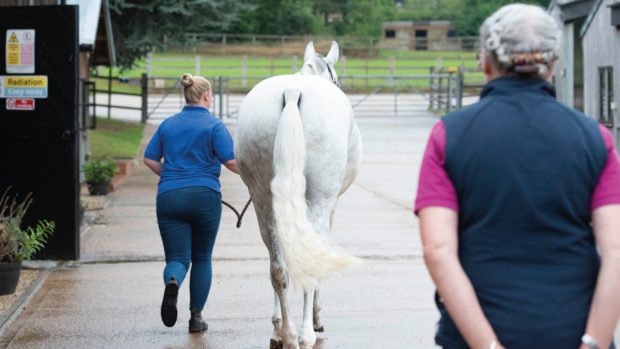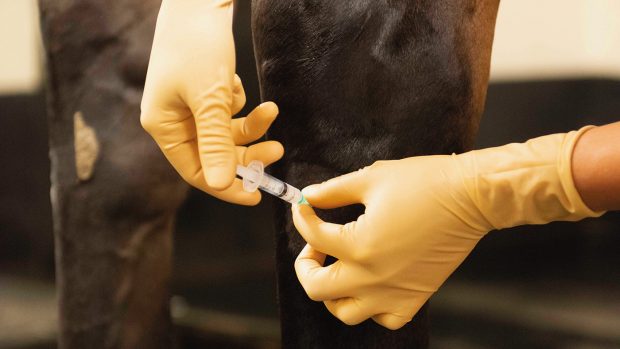Graham Fletcher shares his thoughts on the rising cases of horse injuries – and treating humans
It seems to me that injuries to horses are more common today than they were three or four decades ago – which is bizarre when I think about how many rounds we used to jump back then. As for the going… We were always pleased when a show watered the ground, because many didn’t; and we also jumped on soft to heavy footing.
At what used to be England’s best show, the four-day Royal, for each main-ring class, they’d take the top 24 from a preliminary ring, where 60 to 80 horses had jumped – except the last day’s national championship, which was over three rounds. It was possible, therefore, to jump 13 rounds over four days – and the mindset of all riders then was not to give horses a day off.
Aachen – then and now regarded by many as the world’s best show – lasted 10 days. Qualifying for main classes required an awful lot of jumping. The grand prix on the Sunday is a wonderful class in front of 40,000 knowledgeable spectators. I was lucky enough to win it on Buttevant Boy over two full rounds followed by eight puissance-type fences, then four of us went into a speed jump-off. The horses certainly knew they’d had a class!
Thanks to improved horse welfare, they’ve never been better looked after, as they deserve to be. Poles are lighter and collapsible back cups have reduced falls.
All-weather arenas have taken the sting out of hard ground and well-drained grass arenas are underlaid with sand. I remember how, when it rained heavily at Hickstead, the Sussex clay was hard work for the horses. Now, with its state-of-the-art rings, it’s a totally different ball game.
So why so many injuries? Tendon injuries were rare in my day, despite all the jumping horses did.
Top horses are so hard to find nowadays that I can understand people erring on the under-jumping side. Yet that theory is confounded by one of the current top combinations, the great John Whitaker and Equine America Unick Du Francport. Despite doing more shows than most this year, “Frank” has kept his enthusiasm and freshness – a credit to how he’s been produced and managed.
So, what’s John’s secret? First, he likes to turn him out for a few hours, but being a sharp horse, Frank would never settle – until he got a donkey friend. Now he happily has a spell in the field. John’s second tip is another that means his yard has few soundness problems – and that’s doing roadwork. Sadly, traffic makes it difficult for some to do likewise, but getting horses out of the arena onto the fields or tracks has undoubted benefits.
As we adopt modern ideas, maybe we shouldn’t discard successful traditions – but instead take the best from both?
Funding healthcare
Few horse people haven’t been eternally grateful to our ambulance crews and the NHS after a bad fall. As Mr Jorrocks said: “A fall is an awful thing.” And that’s not changed nearly 200 years later.
It’s certainly awful if one of your children has a bad one; there’s no worse feeling than seeing them in terrible pain. Like all of you who’ve had that experience, I’d like to say from the bottom of my heart how much we all appreciate those doctors and nurses. It’s more at the everyday end of healthcare that we hear of lengthy waits for appointments; so it’s interesting to learn how other countries manage.
We’re just back from Vilamoura, where our boys Olli and Will had a successful tour. When your team is away for a month with staff, there’ll always be the odd health problem – and the chance to see how another system works.
Not long ago, Portugal was regarded as one of Europe’s poorer countries. But their health provision is top-class. If you need an emergency appointment, you’re seen within minutes at the doctor’s surgery – at a cost of £50.
I’m sure a big percentage of Brits would be pleased to pay that for a similar service. Then maybe our nurses and carers could be paid what they deserve.
● Do you agree with Graham? Write to us at hhletters@futurenet.com. Please include your name, nearest town and county for potential inclusion in the magazine.
- This exclusive column will also be available to read in Horse & Hound magazine, on sale Thursday 8 December 2022
You may also be interested in…

Watch this amazing jump-off recovery: ‘I don’t think the crowd will forget that round!’

A staggering 75 wins this year (and counting): what are the secrets to this rider’s success?

Messi takes World Cup win – in a second sport this weekend

Subscribe to Horse & Hound magazine today – and enjoy unlimited website access all year round
Horse & Hound magazine, out every Thursday, is packed with all the latest news and reports, as well as interviews, specials, nostalgia, vet and training advice. Find how you can enjoy the magazine delivered to your door every week, plus options to upgrade your subscription to access our online service that brings you breaking news and reports as well as other benefits.




